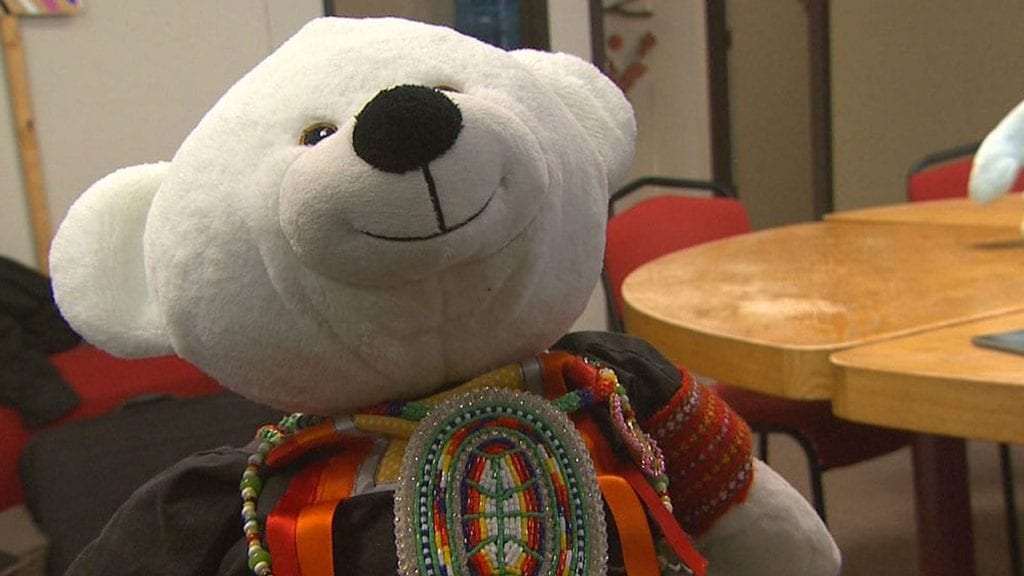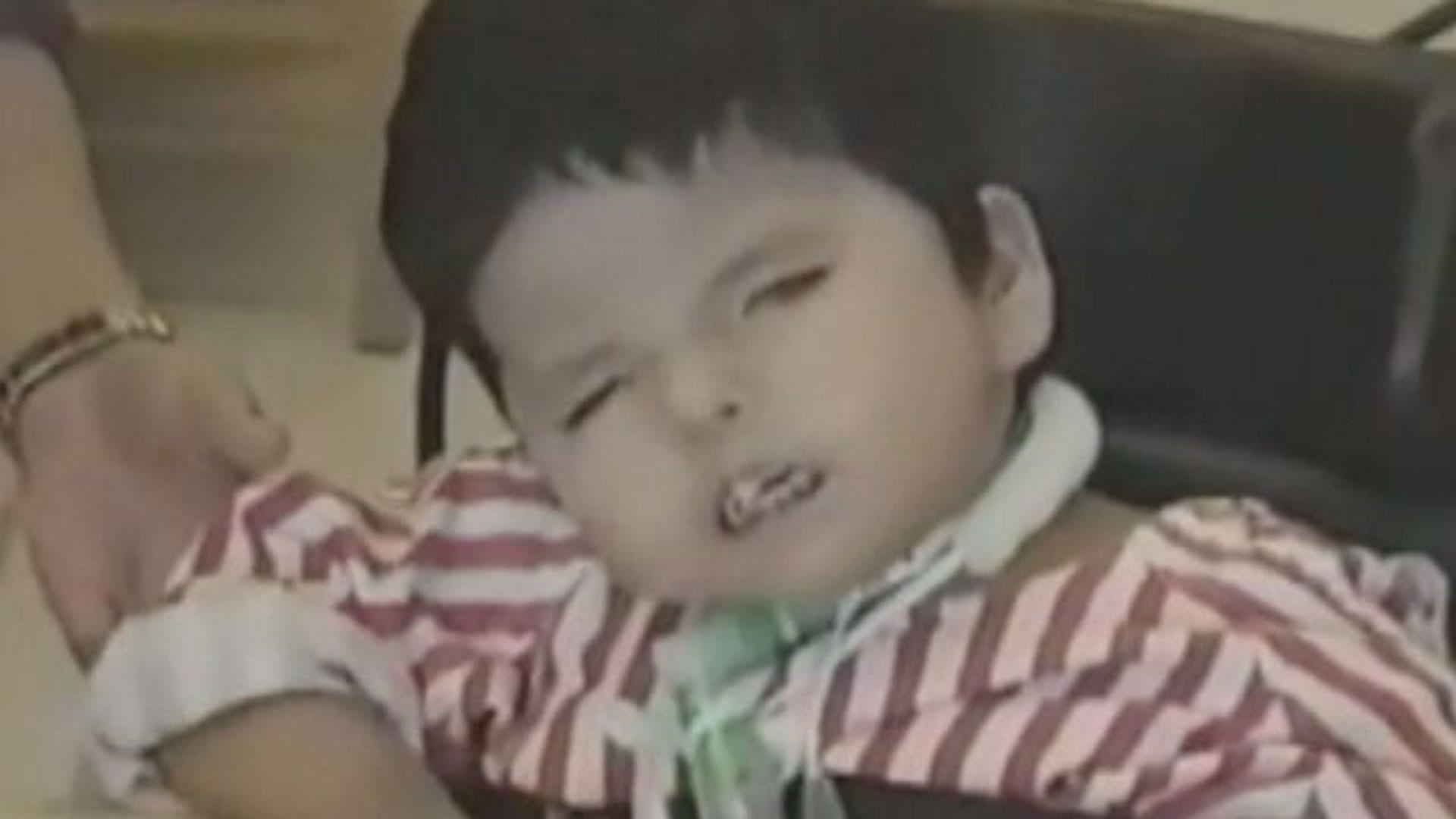
The Spirit Bear has become a symbol in the fight to end systemic discrimination against First Nations children. Photo: APTN
Canada claims it has “no duty to compensate” thousands of First Nations families and children who suffered or died waiting for essential services Ottawa is legally obligated to provide under what’s now known as Jordan’s Principle.
Ottawa plans to fight in court against these families because their claims date to before 2007, arguing Canada isn’t legally liable for their suffering because Jordan’s Principle didn’t exist yet, according to court documents.
“The Crown maintains that Jordan’s Principle did not become [legally] actionable until Parliament passed a resolution formally recognizing it on Dec. 12, 2007, and that the Jordan’s Principle class members whose claims arose before that time cannot succeed,” wrote lawyers representing victims and families on April 9.
“The Crown wishes to advance its defence in court in respect of those claims.”
The families and now adult children are part of a national class-action lawsuit originally filed in 2019 by Xavier Moushoom and soon after joined by Jeremy Meawasige, the Assembly of First Nations (AFN) and several others.
The suit seeks $10 billion for victims of Canada’s wilfully underfunded child welfare system and refusal to implement Jordan’s Principle between 1991 (cutoff for the ’60s Scoop class action) and now.

Last September, Ottawa announced it would not fight certification, which is a procedural hearing that allows a lawsuit to proceed in group form.
But documents filed later reveal the Crown had, in fact, “conditioned its consent” and would only certify if the Jordan’s Principle victims from between 1991 and 2007 were removed.
The lawyers vehemently disagreed, arguing that the federal government always had a legal responsibility under the charter to fund essential services for First Nations kids living on reserves.
Jordan’s Principle, they argued, just gave a name to a rule that always existed.
But, counsel explained, Ottawa can’t be forced to mediate claims it wishes to fight, so the lawyers proposed splitting the lawsuit into two.
Under this plan, the child welfare victims and some Jordan’s Principle victims would enter mediated settlement talks, while the others would eventually “have their day in court” against Canada.
They have selected another lead plaintiff who is “motivated to vigorously advance” the remaining claims in court.
“The alternative — holding up resolution until every disputed issue has been fully and finally litigated — is harmful to class members and inconsistent with the goal of reconciliation,” the attorneys explained. “There is no suggestion that the Crown is acting in bad faith in taking this position.”
Read More:
But at least one person, the NDP’s Charlie Angus, disagrees.
The northern Ontario MP called the government’s position “a perfect example of the toxic bad faith by which the Trudeau government have responded to their obligations to deal with systemic discrimination against Indigenous children.”
Angus has watched the same issues wind through the Canadian Human Rights Tribunal over the last 14 years. While complicated legally, Angus said matter is simple at heart.
“The federal government knowingly discriminated systemically and destroyed the lives of thousands of Indigenous youth. They will use legal technicalities to continue to deny these people access to justice,” he said.
“This is what they’ve done with the residential school survivors from St. Anne’s. This is what they’ve done time and time again with the human rights tribunal. It has to stop. Canadians expect the government to do the right thing, right now.”
On June 3, NDP Leader Jagmeet Singh tabled an opposition motion in the House of Commons demanding the Liberals halt court battles against Indigenous families, children and survivors.
Prime Minister Justin Trudeau is under pressure from opposition and First Nations leaders to respond to the confirmation of a mass grave’s existence — reportedly containing remains of 215 children — at a former residential school in Kamloops, B.C.
Trudeau has ordered flags flown at half-mast and his government made $27 million from 2019 available for communities who also wish to search former residential school grounds in their territories.
But the NDP, Conservatives, Bloc Québécois and Greens all agree it’s not enough.
“They lowered the flag,” Angus remarked. “I would say lower the flag and call off your lawyers. That’s justice. That’s what Canadians expect to make this right.”
Singh told the House that, as a reconciliatory gesture, Trudeau should drop two Federal Court appeals set to get underway on June 14, which are related to, but separate from, the class action.
Canada is appealing two human rights tribunal rulings which, respectively, order it to pay the victims of its human rights violations — which the tribunal found were wilful and reckless — and extend Jordan’s Principle to certain non-status First Nations kids.
Class counsel David Sterns said he couldn’t comment on the case, given the confidentiality of the mediation, but agreed with the sense of urgency.
“This case cries out for urgent resolution,” said Sterns. “It is extremely frustrating that we, at this stage of the case, have nothing to announce.”
Jordan River Anderson’s own family potentially excluded from claim
Cindy Blackstock joined Angus and Singh at the press conference demanding the Liberals halt their Indigenous litigation.
In a past interview, Blackstock said Ottawa’s legal position on some of the Jordan’s Principle claimants is “egregious.”
She said Canada knew well before 2007 that jurisdictional disputes and bureaucratic inertia were harming thousands of children and families.
“In some cases, like in the tragic case of Jordan, where a child’s life was lost, the government is going to fight against a grieving family who simply wants some measure of justice,” said Blackstock.
“I think it’s really appalling. But, unfortunately, it’s pretty consistent with what Canada is doing even with the children after 2007.”
By Jordan she meant Jordan River Anderson, a young Norway House Cree Nation boy born with complex medical needs in 1999. After he was born, his family surrendered him into provincial care due to a lack of services on reserve.
When he was two years old, doctors said he could move to a specialized foster home, but Manitoba and Ottawa couldn’t agree on who would foot the bill.
The governments were still bickering when Jordan died in 2005, at age five, having spent his entire life in hospital.

Ottawa’s position suggests Jordan River Anderson’s family would not be eligible for compensation through the class action because the principle that bears his name hadn’t been adopted yet.
Indigenous Services Minister Marc Miller’s office refused to clarify when asked if this was indeed the government’s stance.
But the department did accidentally leak an internal email chain that suggested APTN News was asking “leading questions” for seeking comment on the tribunal appeals and Ottawa’s legal position in the class action.
“I don’t think we are going to be able to say much beyond our holding lines here,” a policy adviser wrote. “They are leading questions but don’t know if others feel differently.”
The NDP, whose motion in the House called the government’s approach “belligerent and litigious,” saw it differently.
“When you read the actual government arguments, you see cynicism writ large. They will use any technicality and a brazen disregard for justice,” Angus told APTN.
“They will use every tactic, just as they have against the St. Anne’s survivors, rather than do the right thing — and they need to do the right thing.”
No court date has been set for the claimants to argue for certification in the separated class action.
Leonard Mandamin was formally appointed mediator for the rest of the class on May 31.
Mandamin is a former Federal Court judge from Wiikwemkoong Unceded Territory on Manitoulin Island.
In 2013, he ruled Canada was violating Jordan’s Principle by refusing to pay for lead plaintiff Meawasige’s home care.










